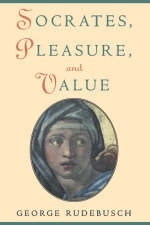
Socrates, Pleasure, and Value
Seiten
2002
Oxford University Press Inc (Verlag)
978-0-19-515961-5 (ISBN)
Oxford University Press Inc (Verlag)
978-0-19-515961-5 (ISBN)
Addressing whether Socrates was a hedonist, the author examines the passages in Plato's early dialogues that are the most disputed on the topic. He maintains that Socrates identifies pleasant activity with virtuous activity, describing Socrates' hedonism as one of activity, not sensation.
In the past quarter century, enormous philosophical attention has been paid to Plato's "Socratic" dialogues, as interpreters have sought to identify which dialogues are truly Socratic and interpret and defend the moral theories they find in those works. In spite of this intellectual energy, no consensus has emerged on the question of whether Socrates was a hedonist-whether he believed pleasure to be the good. In this study, George Rudebusch addresses this question and the textual puzzle from which it has arisen.
In the Protagoras, Plato has Socrates appeal to hedonism in order to assert his characteristic identification of virtue and knowledge. While in the Gorgias, Socrates attributes hedonism to his opponent and argues against it in defence of his own view that doing injustice is worse than suffering it. From the Apology and Crito, it is clear that Socrates believes virtue to be the supreme good. Taken together, scholars have found these texts to be incoherent and seek to account for them either in terms of the development of Plato's thinking or by denying that one or more of these texts was meant to reflect Socrates' own ethical theory.
Rudebusch argues instead that these texts do indeed fit together into a coherent moral theory as he attempts to locate Socrates' position on hedonism. He distinguishes Socrates' own hedonism from that which Socrates attacks elsewhere. Rudebusch also maintains that Socrates identifies pleasant activity with virtuous activity, describing Socrates' hedonism as one of activity, not sensation. This analysis allows for Socrates to find both virtue and pleasure to be the good, thus solving the textual puzzle and showing the power of Socratic argument in leading human beings toward the good.
Tackling some of the most fundamental debates over Socratic ethics in Plato's earlier dialogues, Socrates, Pleasure, and Value will generate renewed discussion among specialists and provide excellent reading for courses in ancient philosophy as well as ethical theory.
In the past quarter century, enormous philosophical attention has been paid to Plato's "Socratic" dialogues, as interpreters have sought to identify which dialogues are truly Socratic and interpret and defend the moral theories they find in those works. In spite of this intellectual energy, no consensus has emerged on the question of whether Socrates was a hedonist-whether he believed pleasure to be the good. In this study, George Rudebusch addresses this question and the textual puzzle from which it has arisen.
In the Protagoras, Plato has Socrates appeal to hedonism in order to assert his characteristic identification of virtue and knowledge. While in the Gorgias, Socrates attributes hedonism to his opponent and argues against it in defence of his own view that doing injustice is worse than suffering it. From the Apology and Crito, it is clear that Socrates believes virtue to be the supreme good. Taken together, scholars have found these texts to be incoherent and seek to account for them either in terms of the development of Plato's thinking or by denying that one or more of these texts was meant to reflect Socrates' own ethical theory.
Rudebusch argues instead that these texts do indeed fit together into a coherent moral theory as he attempts to locate Socrates' position on hedonism. He distinguishes Socrates' own hedonism from that which Socrates attacks elsewhere. Rudebusch also maintains that Socrates identifies pleasant activity with virtuous activity, describing Socrates' hedonism as one of activity, not sensation. This analysis allows for Socrates to find both virtue and pleasure to be the good, thus solving the textual puzzle and showing the power of Socratic argument in leading human beings toward the good.
Tackling some of the most fundamental debates over Socratic ethics in Plato's earlier dialogues, Socrates, Pleasure, and Value will generate renewed discussion among specialists and provide excellent reading for courses in ancient philosophy as well as ethical theory.
ONE. Introduction ; TWO. Plato's Aporetic Style ; THREE. Ethical Protagoreanism ; FOUR. Callicles' Hedonism ; FIVE. Callicles Refuted ; SIX. Death Is One of Two Things ; SEVEN. The Intrinsic Value of Sense Pleasure and Pain ; EIGHT. The Righteous Are Happy ; NINE. Does Socrates Conistently Hold th Sufficiency Thesis? ; TEN. How Socrates Can Make Both Pleasure and Virtue the Chief Good ; Notes ; Bibliography ; Index of Passages ; General Index
| Erscheint lt. Verlag | 1.12.2002 |
|---|---|
| Verlagsort | New York |
| Sprache | englisch |
| Maße | 231 x 155 mm |
| Gewicht | 309 g |
| Themenwelt | Geisteswissenschaften ► Philosophie ► Ethik |
| Geisteswissenschaften ► Philosophie ► Philosophie Altertum / Antike | |
| Geisteswissenschaften ► Sprach- / Literaturwissenschaft ► Anglistik / Amerikanistik | |
| Geisteswissenschaften ► Sprach- / Literaturwissenschaft ► Literaturwissenschaft | |
| ISBN-10 | 0-19-515961-6 / 0195159616 |
| ISBN-13 | 978-0-19-515961-5 / 9780195159615 |
| Zustand | Neuware |
| Haben Sie eine Frage zum Produkt? |
Mehr entdecken
aus dem Bereich
aus dem Bereich
unsere kollektive Verantwortung
Buch | Hardcover (2023)
wbg Theiss in Wissenschaftliche Buchgesellschaft (WBG) (Verlag)
CHF 46,90


